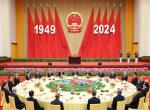The second round of the India-US strategic dialogue has not produced anything especially noteworthy. The bilateral agenda is “transformational” in scope, as it seeks to overcome the hurdles and inhibitions of the past, and has spawned 21 Dialogues and Working Groups on diverse subjects. Progress, however, depends not on the wishes of one side, but on the capacity of the two sides to establish a mutually beneficial basis of engagement.
We have to be careful about terminological hype. Why accelerate the pace of consensus building on difficult issues by wrapping the exercise in the verbal mantle of a “strategic” relationship. Many of the economic issues on the agenda relate to market access for US companies whose only “strategic” interest is profits and shareholder value. What is specifically strategic in the bilateral demand made on us to introduce more banking, insurance, retail trade and labour reforms?
On terrorism, the US gives us support within the limitations of its valued realtionship with Pakistan and the new compulsions arising from its entanglement in Afghanistan, from which it wants to extract itself sufficiently to enable President Obama to go in for his re-election. Pakistan has heard the American calls for bringing the perpetrators of the Mumbai carnage to justice often enough to ignore them, and Clinton has acknowledged in her joint press conference yesterday that there are limitations on what the US and India can do to make Pakistan perform. What she implies is that despite growing frustration with Pakistan, the US will not use the leverages at its disposal to compel it to eliminate terrorist safe-havens on its territory and would not expect India to ratchet up pressure either. The bilateral Homeland Security dialogue is valuable in building up our capacities to handle the terrorist threat, but there are big opportunities here as well for US companies specializing in producing or integrating security equipment.
On Afghanistan, we have now endorsed an Afghan-led and Afghan owned inclusive reconciliation process. With an Afghan government so dependent on US support, and the “reconciliation” process being so vital for some of US’s Nato partners in particular, this Afghan led and owned process seems a bit of a sham. Does it mean that Pakistan will be kept out, or the Taliban groups it backs? Hardly likely.
On the civil nuclear issue, Secretary Clinton is hoping that India’s ratification of the Convention on Supplementary Compensation by the end of the year will resolve the problem of liability raised for US companies by our Nuclear Liability Legislation. She has exhorted us to work with the IAEA to make our legislation compatible with international practice. This implies a legal watering down of our domestic law on the ground that it should conform to international law. This doesn’t seem a viable prospect.
On the issue of transfer of Enrichment and Reprocessing(EPR) technologies to India, further restricted at last month’s NSG meeting in the Netherlands by listing NPT membership as one of the criteria for eligibility, Clinton skirted the issue by stating that nothing in the new restrictions detracting form the impact and importance of the India-US nuclear deal, and reiterated the mantra of US commitment to full civilian cooperation with India. How the US position against such transfers to India, conveyed to the Congress at the time of negotiating the nuclear deal, the subsequent G-8 stand, and now the NSG decision, to both of which the US was a party, can be reconciled with India’s expectations and interpretations is a riddle that remains to be solved. The US position is legally clear but it is using politically comforting formulations so as not to embarrass the Indian partner.
On other veritably strategic issues such as high and dual use technology or space matters the second round showed no advance. On defence, the pending three agreements on logisitics, inter-operability and geo-spatial cooperation seem to be off the agenda for the time being, but defence procurement from the US has progressed satisfactorily despite the rebuff to the US companies in the 126 fighter deal, to which the US seems to have reconciled itself.
All in all the second round produced the results it realistically could.
----------------------------------------------------------
Published in Mail Today Dated: 20th July, 2011









Post new comment